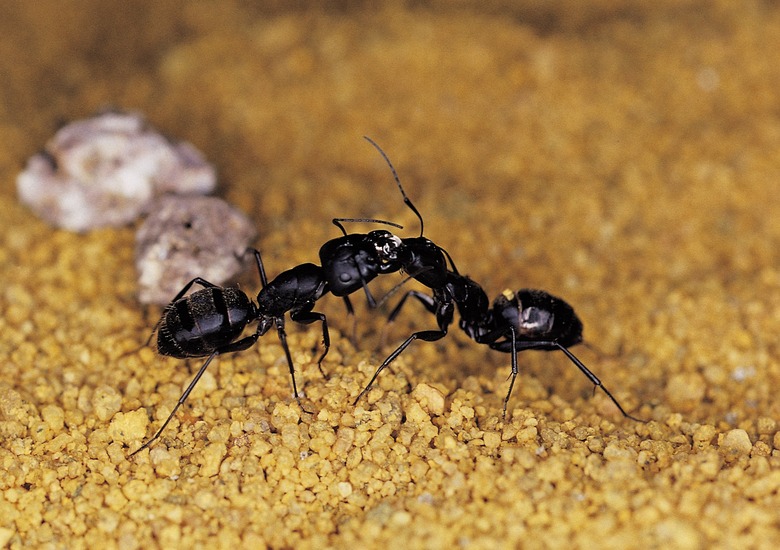Will Permethrin Kill Ants?
Ants build mounds that ruin your lawn, and they're an annoying and persistent pest indoors too. Permethrin, a synthetic insecticide, works by attacking the neurological system of ants and other insects when they come in contact with or ingest it. When used as directed, permethrin can be a safe and effective way to eradicate ants in your home and landscape.
Permethrin
Step 1
Permethrin is the synthetic, chemical form of pyrethrum, a natural pesticide derived from chrysanthemum flowers. Permethrin is the active ingredient in several synthetic insecticides used to control ants as well as fleas and ticks, and plant pests such as scale insects, aphids and mealybugs. These are contact insecticides and stomach poisons that require the insect to ingest or come in direct contact with them to be effective. Because permethrin has a low toxicity to people, pets and birds, it's often used indoors, but permethrin is still mildly toxic to these creatures, and is highly toxic to fish, beneficial insects and bees.
- Ants build mounds that ruin your lawn, and they're an annoying and persistent pest indoors too.
- Because permethrin has a low toxicity to people, pets and birds, it's often used indoors, but permethrin is still mildly toxic to these creatures, and is highly toxic to fish, beneficial insects and bees.
Ants
Step 1
With thousands of ant species in existence, identifying which ant is invading your home or garden is difficult. Some species commonly found around North American homes include carpenter ants (Camponotus spp.), large ants that may be black or red and black in color; and pavement ants (Tetramorium caespitum), which are reddish brown to black. Cornfield ants (Lasius alienus) are light to dark brown and typically prefer to nest in the soil, where they create small craters, and thief ants (Solenopsis molesta) are very small yellow to light brown ants that like to nest near larger ants so they can steal their larvae.
Applying Permethrin Products
Step 1
Application of permethrin insecticides depends on the area you're treating, the ant you're controlling and the form of permethrin you're using. For example, granular formulas are spread with a fertilizer spreader at a rate of 2 pounds per 1,000 square feet of lawn — or they're sprinkled over each ant mound as a spot treatment. Liquid, aerosol and dust permethrin formulas typically require no mixing or dilution. However, select only products that are clearly labeled as safe for home or garden use. Each brand of permethrin insecticide is different, with its own instructions that must be followed to prevent damage or injury and for optimum effectiveness. It also helps to identify the ant infesting your home to ensure you're using the appropriate formulation and method. For example, carpenter ant control requires spray insecticides applied directly into the nest, while control of cornfield ants is best achieved by treating the lawn and the perimeter of your home with granular or liquid insecticides. Yellow ant control involves eliminating winged forms by spraying them with an aerosol insecticide.
- With thousands of ant species in existence, identifying which ant is invading your home or garden is difficult.
- For example, carpenter ant control requires spray insecticides applied directly into the nest, while control of cornfield ants is best achieved by treating the lawn and the perimeter of your home with granular or liquid insecticides.
Natural Ant Control
Step 1
Permethrin is a chemical that is mildly toxic to humans and pets, and when used outdoors it can kill beneficial insects such as bees, so minimize the use of chemicals in your home and landscape by using natural control methods first. Seal all food in airtight containers and clean up spills immediately to eliminate all food sources for ants in your home. Clean with vinegar and water to remove any trails left behind. Seal all cracks and holes in your home with caulking to prevent ants from entering your home in the future. In the yard, remove debris and seal garbage containers to make the landscape less appealing to ants. Rinse your plants regularly with clean water to remove sucking pests such as aphids, which secrete honeydew and attract ants.
